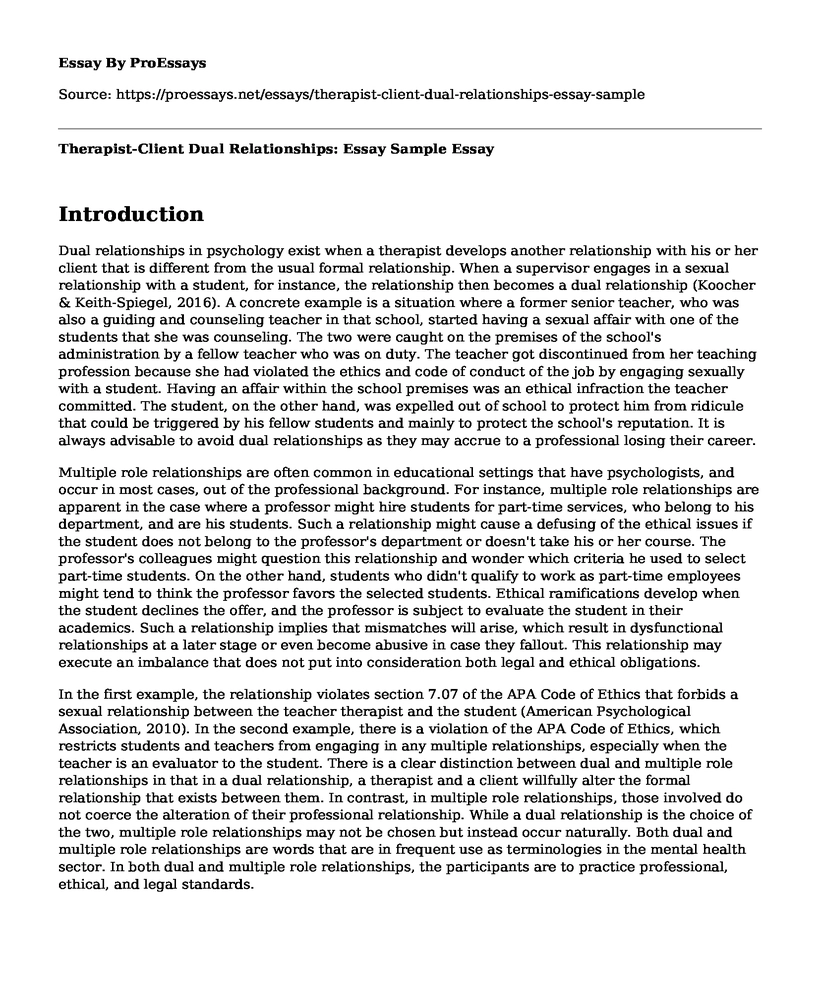Introduction
Dual relationships in psychology exist when a therapist develops another relationship with his or her client that is different from the usual formal relationship. When a supervisor engages in a sexual relationship with a student, for instance, the relationship then becomes a dual relationship (Koocher & Keith-Spiegel, 2016). A concrete example is a situation where a former senior teacher, who was also a guiding and counseling teacher in that school, started having a sexual affair with one of the students that she was counseling. The two were caught on the premises of the school's administration by a fellow teacher who was on duty. The teacher got discontinued from her teaching profession because she had violated the ethics and code of conduct of the job by engaging sexually with a student. Having an affair within the school premises was an ethical infraction the teacher committed. The student, on the other hand, was expelled out of school to protect him from ridicule that could be triggered by his fellow students and mainly to protect the school's reputation. It is always advisable to avoid dual relationships as they may accrue to a professional losing their career.
Multiple role relationships are often common in educational settings that have psychologists, and occur in most cases, out of the professional background. For instance, multiple role relationships are apparent in the case where a professor might hire students for part-time services, who belong to his department, and are his students. Such a relationship might cause a defusing of the ethical issues if the student does not belong to the professor's department or doesn't take his or her course. The professor's colleagues might question this relationship and wonder which criteria he used to select part-time students. On the other hand, students who didn't qualify to work as part-time employees might tend to think the professor favors the selected students. Ethical ramifications develop when the student declines the offer, and the professor is subject to evaluate the student in their academics. Such a relationship implies that mismatches will arise, which result in dysfunctional relationships at a later stage or even become abusive in case they fallout. This relationship may execute an imbalance that does not put into consideration both legal and ethical obligations.
In the first example, the relationship violates section 7.07 of the APA Code of Ethics that forbids a sexual relationship between the teacher therapist and the student (American Psychological Association, 2010). In the second example, there is a violation of the APA Code of Ethics, which restricts students and teachers from engaging in any multiple relationships, especially when the teacher is an evaluator to the student. There is a clear distinction between dual and multiple role relationships in that in a dual relationship, a therapist and a client willfully alter the formal relationship that exists between them. In contrast, in multiple role relationships, those involved do not coerce the alteration of their professional relationship. While a dual relationship is the choice of the two, multiple role relationships may not be chosen but instead occur naturally. Both dual and multiple role relationships are words that are in frequent use as terminologies in the mental health sector. In both dual and multiple role relationships, the participants are to practice professional, ethical, and legal standards.
References
American Psychological Association. (2010). Ethical principles of psychologists and code of conduct. Retrieved from http://apa.org/ethics/code/principles.pdf (accessed July 27, 2016).
Koocher, G. P. & Keith-Spiegel, P. (2016). Ethics in Psychology and the Mental Health Professions: Standards and Cases. New York, NY: Oxford University Press. Kindle Edition.
Cite this page
Therapist-Client Dual Relationships: Essay Sample. (2023, Mar 27). Retrieved from https://proessays.net/essays/therapist-client-dual-relationships-essay-sample
If you are the original author of this essay and no longer wish to have it published on the ProEssays website, please click below to request its removal:
- Overview of Kathy Kelly's Life
- Psychology Paper Sample on Children's Cognitive Development
- Music Therapy and Effects of Music on Psychological and Mental Health
- Dalai Lama View on Practice of Universal Compassion Essay
- Jean's Eating Disorder: From BMI to Peer Pressure - Essay Sample
- Hybrid Modelling for Successful Construction Projects - Free Paper
- Social Experiments and Authority Dynamics: Unveiling Human Behavior and Challenges in Leadership - Report Example







